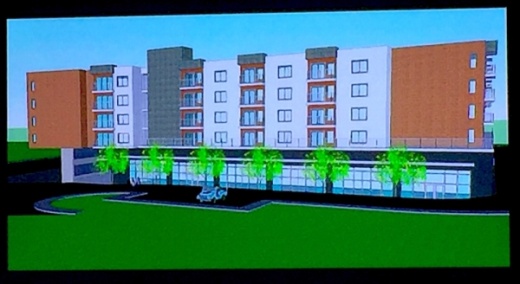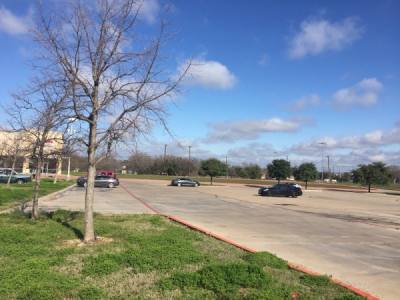Round Rock City Council did not take action on a proposal for affordable housing on Jan. 23. Following a council packet review on Jan. 21, RGC Multifamily, the developer behind the project, requested council wait to take action until Feb. 13, said Round Rock Mayor Craig Morgan.
Instead, Dan Rigney, president and principal of RGC Multifamily, presented his proposal for The Place at Mays Crossing and fielded questions from council.
Early designs for the apartment complex call for four or five stories of residential units built on top of a parking garage structure, Rigney said. Building configurations include two courtyards—one intended to be a quiet place of reflection with water features and landscaped spaces—and the other for activities with a pool, pool cabanas and outdoor grilling space, Rigney said.
Playgrounds and other features for children and families are not in the plans at this time, he said.
"The direction of this project is adult-driven," Rigney said.
Rigney said the goal is to provide workforce housing for entry-level professionals, particularly those in the service industry, in education and in public service professions.
ORIGINAL STORY | Jan. 23 at 11:33 a.m.
A proposal for an affordable apartment complex is posing a difficult decision for Round Rock City Council, with action anticipated Jan. 23.
At issue: an opportunity to act on a stated council priority to provide a range of housing options—including those deemed affordable for the local workforce—juxtaposed with a request to express “no objection” to the developer’s intent to seek property tax exemptions under state law.
Complicating matters further, should council move forward with the resolution for no objection, a state exemption would waive not only the city’s portion of property taxes but also that which belongs to Round Rock ISD, Williamson County and all other taxing entities.
“The spirit and intent behind this—there’s a delta of workforce housing across the country,” said Brad Wiseman, the city’s director of planning and development. “It’s something the market’s not providing. So, to make workforce housing a reality, there’s got to be a give somewhere. Otherwise, the market would be supplying it, and there wouldn’t be all these programs and discussions about affordable housing.”
The proposal
RGC Multifamily has submitted plans for a 224-unit apartment complex on a 2.75-acre site at 150 Mays Crossing Drive, Round Rock. Plans call for income-restricted, multi-family housing in which residents must earn an overall average of 60% of the area median income.
Of the units, 64 are proposed to be 600-square-foot studio apartments. For a studio apartment at 60% of the median income, rent would be $994 a month, Wiseman said. Plans show 110 units as 835-square-foot, one-bedroom apartments, where income-restrict rent would be about $1,065 a month. The remaining 50 units would be 1,035-square-foot, two-bedroom apartments.
By seeking a property tax exemption, the proposal is different from all other income-restricted projects that Round Rock City Council has recently approved, Wiseman said.
“The current council direction has been to require developers to sign a development agreement stating they will not seek any property tax exemptions,” he said.
Wiseman pointed to three recent affordable housing projects in which developers signed an agreement to not seek property tax exemptions. These include Waters at Sunrise at 2750 Sunrise Road; Shadow Ridge Apartments, currently under construction at 2300 Old Settlers Boulevard; and a recently-approved senior housing project on University Boulevard.
Payment in lieu of
In order to make the project work from a financial standpoint, the developers have said they need property tax exemptions, Wiseman said.
“Without the property tax exemptions, they’ve stated that the project is not financially feasible,” he said.
To offset the requested exemptions, the developers are offering an annual fee to the city in lieu of property taxes, Wiseman said. If approved, the city would initially receive $200 per dwelling unit constructed. The fee would increase 3.5% per year. After 17 years, the fee would increase to an amount equal to the then-current tax rate.
For comparison, Wiseman pointed to La Frontera Square, an apartment complex located at 2601 La Frontera Boulevard, Round Rock.
“[La Frontera Square is] on the other side of town, in a vastly different area,” Wiseman said. “But to give you some frame of reference for the city tax portion, La Frontera Square pays $599 per dwelling unit.”
History of the site
As it stands, the land at 150 Mays Crossing Drive is being used as a parking lot. Council members and staff on Jan. 21 stated a desire to redevelop that site into a project similar to the one proposed.
“It’s a site that we haven’t had any development on since I’ve been here,” Mayor Craig Morgan said. “This is an area of town that we’re really trying to redevelop.”
In fact, the current proposal is not the first for an affordable apartment complex at the same site. Round Rock City Council in 2019 approved a rezoning request to a planned unit development, or PUD, to pave the way for such a project.
“There was an original developer when the rezoning was approved,” Wiseman said. “That project did not occur, so this is the second developer that’s attempting to develop the property in accordance with the PUD.”
Council member Tammy Young asked why the first project failed. Wiseman said it was because they could not make the numbers work on the development.
“If we want to redevelop this area, how many of these projects do we let fall away?” Young said.
Morgan pointed to potential economic generation as a result of developing the site into an apartment complex. He said, for him, the specific location was essential to even begin to consider a resolution of no objection for the developer’s desire to seek a property tax exemption.
“I think the big question is—through the waivers of taxes, is there enough economic generation to overcome this to have this here?” Morgan said. “If you put people there, does that open up that retail spot that’s been empty since I’ve been here?”
A policy decision
Several council members voiced concerns about making an exception to a policy.
“I’m kind of back on forth,” Council Member Will Peckham said. “I really like the project and what it’s trying to do. The policy shift is where I’m having a lot of trouble with this.”
Peckham said he was uncomfortable with the effects on the other taxing jurisdictions and the potential impact on Round Rock taxpayers.
“For me, that goes back to our citizens,” Peckham said. “They’re the ones who are going to have to pick up that delta when we’re talking about budgets at the end of the year. That money’s got to come from somewhere.”
Mayor Pro Tem Writ Baese said he struggles with making a decision that takes funding from other taxing entities.
“That challenges me a little bit, particularly as we look at other things happening in our environment where we have other things forced on us by other legislative entities that we don’t like,” Baese said. “We’re imposing our will on somebody else. We’re in that position right now where that’s being done to us in a number of ways, and it is the thing we probably dislike the very, very most.”
Next steps
If council approves the resolution of no objection, the developer is entitled to apply for the property exemptions from the state.
“Technically the city isn’t waiving anything,” Wiseman said. “[Property taxes] would be waived through the federal and state process. But we’d be kicking that off.”
If council denies the resolution of no objection, the developer could approach a different taxing entity—including the county or the school district—and ask for the resolution.
Round Rock City Council is expected to vote on the issue at a Jan. 23 meeting, which begins at 6 p.m. at Round Rock City Hall. A public hearing will be held prior to the vote.






